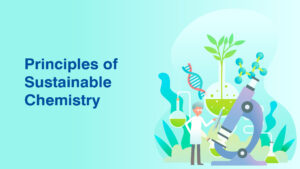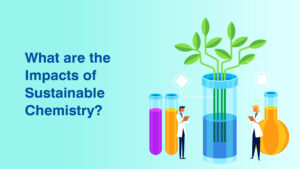Sustainable chemistry, also known as green chemistry, is a burgeoning field that seeks to design and implement chemical processes and products in a way that minimizes their impact on the environment and human health. As the world grapples with pressing environmental challenges, the importance of sustainable practices in the realm of chemistry becomes increasingly evident. This comprehensive exploration delves into the principles and applications of this field of chemistry and its potential impact on various industries and global sustainability.
What is Sustainable Chemistry?
Sustainable chemistry represents a mindset within the realm of chemistry, focusing on reducing the ecological footprint of chemical procedures and goods across their entire lifespan. This concept revolves around crafting, advancing, and utilizing chemical substances and methodologies that are not only ecologically sound but also economically feasible and socially mindful.
Sustainable chemistry and green chemistry are terms often used interchangeably, sharing a closely related concept. Green chemistry specifically emphasizes designing chemical products and processes to minimize or eradicate the use and production of hazardous substances. Meanwhile, sustainable chemistry takes a broader view, considering the overall sustainability of chemical products and processes. It is based on the following:
- utilizing resources—such as energy—at a pace that allows for their natural replenishment
- reducing the use of dangerous materials and encouraging the use of safer substitutes
- creating chemical processes that are efficient and produce minimal waste
- taking into account the complete life cycle of chemical products, from the extraction of raw materials to their disposal
- Encouraging cooperation and information exchange among interested parties in order to progress sustainable chemical practices
Principles of Sustainable Chemistry

Given below are some of the prime principles involved in this field:
- Atom Economy: It places a significant emphasis on atom economy, striving to maximize the incorporation of reactant atoms into the final product while minimizing waste generation. This principle aims to reduce resource consumption and enhance overall efficiency in chemical processes.
- Renewable Feedstocks: The use of renewable feedstocks, such as biomass and other sustainable raw materials, is a key aspect of sustainable chemistry. By shifting away from fossil fuel-based feedstocks, the field aims to reduce reliance on non-renewable resources and decrease the environmental impact of chemical production.
- Energy Efficiency: This involves the development and implementation of methods that minimize energy consumption, thus contributing to the reduction of greenhouse gas emissions and environmental pollution.
- Safer Chemicals: The design and use of safer chemicals are fundamental to sustainable chemistry. This includes avoiding or minimizing the use of toxic substances and prioritizing the creation of products that are inherently less harmful to human health and the environment.
- Catalysis: This plays a pivotal role in sustainable chemistry by promoting more efficient reactions. Catalysts enable reactions to occur under milder conditions, reducing the need for high temperatures and pressures, and ultimately leading to more sustainable processes.
Applications of Sustainable Chemistry
- Green Synthesis of Pharmaceuticals: The pharmaceutical industry has embraced sustainable chemistry to develop greener synthesis routes for drugs. By employing environmentally benign reagents and processes, researchers aim to reduce the environmental impact of drug manufacturing while maintaining the efficacy of pharmaceutical products.
- Sustainable Agriculture: It contributes to the development of environmentally friendly agrochemicals and fertilizers. Innovations in this area focus on minimizing the ecological footprint of agricultural practices, promoting soil health, and ensuring food security for a growing global population.
- Green Energy: The production and storage of renewable energy often involve chemical processes. Sustainable chemistry plays a crucial role in advancing green energy technologies, including the development of efficient and environmentally friendly batteries, solar cells, and hydrogen fuel cells.
- Waste Minimization in Manufacturing: It addresses the issue of waste generation in manufacturing processes. Through the implementation of more efficient reaction pathways and the recycling of by-products, industries can minimize their environmental impact and move towards more sustainable production practices.
- Circular Economy: The concept of a circular economy, where resources are reused and recycled, aligns closely with the principles of sustainable chemistry. By designing products with recyclability in mind and implementing efficient recycling processes, the field contributes to the transition from a linear to a circular economy.
What are the Impacts of Sustainable Chemistry?

Below are some of its major global impacts:
- Environmental Benefits: The adoption of sustainable chemistry practices can offer significant environmental benefits, including reduced pollution, lower carbon emissions, and conservation of biodiversity. These positive impacts contribute to the global effort to address climate change and promote overall environmental sustainability.
- Economic Implications: While there is an initial investment required to transition to sustainable practices, the long-term economic implications are positive. Companies that embrace sustainable chemistry often find cost savings through resource efficiency, waste reduction, and improved public perception, creating a more resilient and competitive business model.
- Education and Collaboration: Addressing these challenges requires a concerted effort in education and collaboration. Educating the current and future generations of scientists, engineers, and policymakers about its principles and benefits is crucial. Additionally, fostering collaboration between academia, industry, and government entities can accelerate the development and implementation of sustainable practices.
Future of Sustainable Chemistry
The future of this field is marked by the integration of emerging technologies. Innovations, such as the utilization of artificial intelligence and machine learning, are actively shaping the field, driving the design of more sustainable chemical processes and the ability to predict the environmental impact of novel materials. Biocatalysis and synthetic biology are also at the forefront, showcasing substantial potential in revolutionizing sustainable chemistry. These approaches harness the capabilities of enzymes and microorganisms to execute specific chemical transformations, presenting environmentally friendly alternatives to traditional synthetic methods.
Furthermore, the realm of chemistry extends its influence into materials science, where researchers are fervently exploring eco-friendly alternatives to conventional materials. This encompasses the development of biodegradable polymers, sustainable packaging materials, and environmentally friendly coatings. As the journey towards sustainability unfolds, the critical role of policy and regulation comes to the fore. Governments and international organizations play a pivotal role in driving the global adoption of sustainable chemistry, offering incentives through regulations, tax incentives, and research funding to propel the transition toward greener practices.
In a Nutshell
Sustainable chemistry stands as a beacon of hope in the quest for a more environmentally conscious and resilient world. By integrating the principles of atom economy, renewable feedstocks, energy efficiency, safer chemicals, and catalysis, this field has the potential to revolutionize industries and contribute to a more sustainable future. As innovations continue to emerge and global collaboration strengthens, this will play a pivotal role in shaping a greener world for generations to come.






